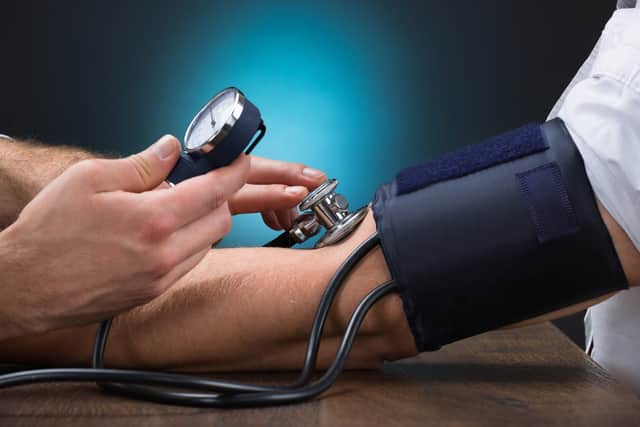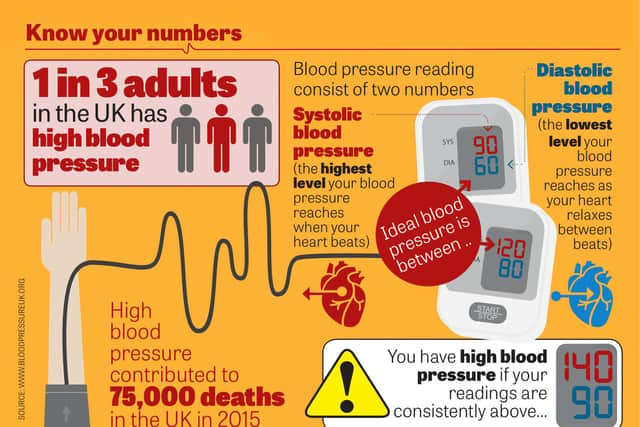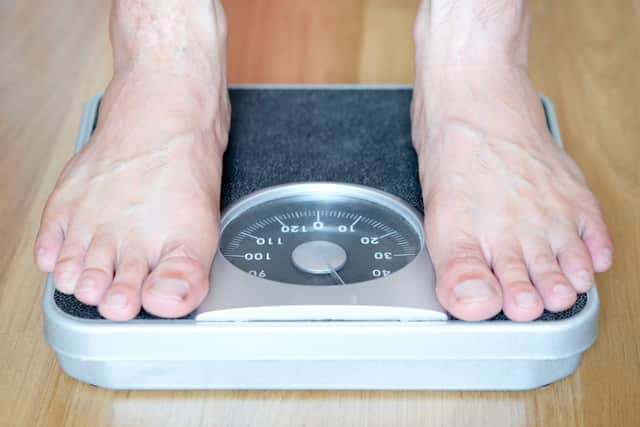How knowing your numbers can help cut the risk of heart disease and strokes


Do you know your numbers? That's the question being asked by Blood Pressure UK this week as part of an awareness-raising campaign which is showing people how they can cut the ri.
September 9 to 15 is Know Your Numbers week - the organisations flagship campaign - and people are being encouraged to have an understanding of blood pressure numbers and take action to reach and maintain a healthy blood pressure.
Advertisement
Hide AdAdvertisement
Hide AdA spokesman for the campaign said hat although there are many steps to living a healthy life such as stopping smoking and watching what we eat and drink, one of the simplest is knowing our blood pressure numbers.


Graphic by Craig Lightowler
High blood pressure can lead to a number of health problems – including heart attacks and strokes, but once you know your numbers, you can get help and support to get it under control.
Around a third of people in the UK are thought to have high blood pressure – but most aren’t aware of it.High blood pressure in itself may not cause any symptoms, so the only way to find out is to have a blood pressure check.
Blood Pressure UK is encouraging people to get their blood pressure checked – either at one of their Pressure Stations during Know Your Numbers week, or by visiting their community pharmacy or practice nurse. You can find out where your nearest Pressure Station is online here.


Advertisement
Hide AdAdvertisement
Hide AdIdeally, blood pressure should be below 120/80, giving a much lower risk of heart disease or strokes.
However, most adults in the UK have readings of between 120/80 and 140/90. Experts say if that is the case, people should be taking steps to bring it down or stop it rising any higher.
Here are Blood Pressure UK’s five top tips to bring your reading down if it is on the high side:
Eat less salt – too much salt raises blood pressure, so try to eat as little as possible. Don’t add salt to food when cooking or at the table, and when shopping, check labels and choose lower salt options when you can.Eat more fruit and vegetables – eating at least five portions a day will help to lower your blood pressure. Try to eat a range of different fruits and veg – dried, frozen and tinned are fine as well as fresh.Keep to a healthy weight - losing weight, if you need to, will help to lower your blood pressure. Choose food which is lower in fat and calories. Making small changes to your eating habits can make a big difference.
Advertisement
Hide AdAdvertisement
Hide AdDrink less alcohol – too much alcohol can raise blood pressure over time. The recommended limits are 14 units of alcohol a week for men and women. A unit is roughly half a pint of beer or cider, a small glass of wine or a single pub measure of spirits.Get more active – being moderately active for 30 minutes, five times a week can keep your heart healthy and lower your blood pressure. Even increasing your activity by a small amount can make a difference.